To truly call ourselves a profession there needs to be deep engagement, ongoing improvement, and constant learning. In education there is no such thing as best practice, only striving for better practice. Those who are always learning, adapting, reflecting and seeking new pedagogy can much better serve the needs of each individual student in an ever changing world. It makes sense that a teacher toolbox filled with a variety of delivery and assessment tools better serves students in a complex world rather than a teacher who always uses a tool or approach they love and know well. “If the only tool you have is a hammer, everything starts to look like a nail…” Change is not a thing that happens to people and organizations, it is a constant and a given. Those who seek professional learning that responds to the current needs of students will continue to see students thrive in an ever changing complex landscape.
In creating the new normal coming out of this global pandemic we have great opportunity to learn, adapt and focus on the things that have highest leverage for student learning. Professional learning (development) is no exception, let’s learn, reflect, adapt and create a new normal of personalized pathways, robust communities of practice, and long term partnerships that serve the needs of today’s learners, adult and student learners.
At Frankfurt International School 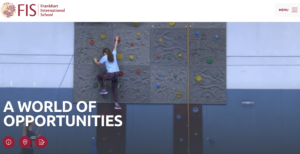 we are striving to learn from the last year to make professional learning a more targeted and impactful endeavour. We have learned a great deal from both attending and facilitating online and hybrid experiences like this Innovation and Maker Workshop or the great variety of workshops by the Global Online Academy (GOA). We have two campuses and it has certainly been a game changer for us in bringing collaboration across a physical distance to a whole new level. What is your school doing? Please share in the comments below.
we are striving to learn from the last year to make professional learning a more targeted and impactful endeavour. We have learned a great deal from both attending and facilitating online and hybrid experiences like this Innovation and Maker Workshop or the great variety of workshops by the Global Online Academy (GOA). We have two campuses and it has certainly been a game changer for us in bringing collaboration across a physical distance to a whole new level. What is your school doing? Please share in the comments below.
Personalized Pathways – Schools worldwide are striving to offer personalized pathways for students. Why would it be any different for teachers? The human desire to dig into your passions, be curious and learn doesn’t change as you get older, the learning process stays the same. Schools have even greater opportunity to support teachers with their personal pathways as the pandemic has drastically improved the online and hybrid learning experiences. We have seen the number of individual and small group experiences explode this year and our teachers are taking full advantage. As they choose from the buffet of learning options they are putting together an experience that makes sense for what they need. 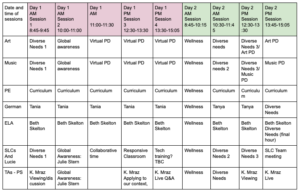 Coupling this with what the school can offer in small team or large divisional settings can provide diverse pathways for teachers. For the PD days in October at FIS there were many options for teams and individuals with a common strand of teacher and staff wellness to pull the community together. As mentioned above, our partnership with GOA has led to asynchronous, synchronous and hybrid opportunities that our teachers can take advantage of in their time schedule. It not only impacts the teachers learning but we are seeing the impact on student asynchronous, synchronous and hybrid opportunities.
Coupling this with what the school can offer in small team or large divisional settings can provide diverse pathways for teachers. For the PD days in October at FIS there were many options for teams and individuals with a common strand of teacher and staff wellness to pull the community together. As mentioned above, our partnership with GOA has led to asynchronous, synchronous and hybrid opportunities that our teachers can take advantage of in their time schedule. It not only impacts the teachers learning but we are seeing the impact on student asynchronous, synchronous and hybrid opportunities.
Communities of Practice – Who are your people? Who do you lean on for learning, exemplars, pushing your thinking? In this day and age the communities of practice beyond your physical team are endless. A great teacher I worked with once told me in an interview, “When you hire me you don’t just get me, you hire the thousands of people I interact with daily online and the best of what they do”. Thanks Intrepid Teacher. From that moment I jumped on Twitter and have to say it’s where I find most of my professional reading based on who I follow. 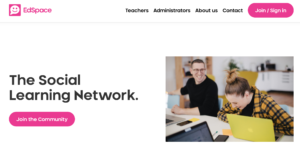 Some are a part of a Twitter community, Facebook, or any other social media platform like Ed Space , directly aimed for teachers and by teachers. Others publish and share in an attempt to start or contribute to communities of practice. My website is an example, it helps me to reflect, share and hone my craft as an educator. We are now attempting to gather all the spaces where our FIS teachers contribute, reflect and share, like this example from our elementary school Assessment4Learning. I am a member of several communities of practice that I feel make me a better educator and leader.
Some are a part of a Twitter community, Facebook, or any other social media platform like Ed Space , directly aimed for teachers and by teachers. Others publish and share in an attempt to start or contribute to communities of practice. My website is an example, it helps me to reflect, share and hone my craft as an educator. We are now attempting to gather all the spaces where our FIS teachers contribute, reflect and share, like this example from our elementary school Assessment4Learning. I am a member of several communities of practice that I feel make me a better educator and leader. 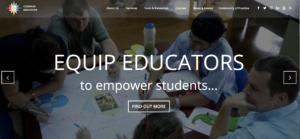 Collaboratives like Compass education help me implement deep thinking and create a better future through education. The Common Ground Collaborative CGC seeks to help students get the learning they need in this day and age. Who are your communities of practice that make you better at what you do? What communities of practice do you lead?
Collaboratives like Compass education help me implement deep thinking and create a better future through education. The Common Ground Collaborative CGC seeks to help students get the learning they need in this day and age. Who are your communities of practice that make you better at what you do? What communities of practice do you lead?
Long Term Relationships – The pandemic has really accelerated the conversation around the classic one and done PD model. Fly in and fly out and hope it sticks. We know this doesn’t work for our students so why would it work for adults? We all need to revisit, reflect, apply, transfer and cycle again. The mix of asynchronous, synchronous and hybrid learning has allowed global consultants to establish long term relationships with schools, teams and individuals.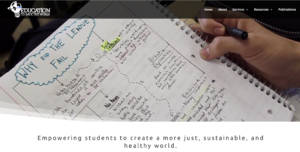 FIS has been and plans to continue to work with Julie Stern and Education to Save the World as we delve into authentic learning transfer in many areas. We have watched as our teachers work with each other, touch base with members of Julie’s team, have a synchronous team session and combinations and timing that works for their learning. Our long term relationships with Erin Kent for literacy, Paul Anderson @ The Wonders of Science for NGSS, IB, and anyone we feel helps us reach our goals as a school are long term commitments and in combination create the learning we feel is most important for teachers.
FIS has been and plans to continue to work with Julie Stern and Education to Save the World as we delve into authentic learning transfer in many areas. We have watched as our teachers work with each other, touch base with members of Julie’s team, have a synchronous team session and combinations and timing that works for their learning. Our long term relationships with Erin Kent for literacy, Paul Anderson @ The Wonders of Science for NGSS, IB, and anyone we feel helps us reach our goals as a school are long term commitments and in combination create the learning we feel is most important for teachers.
Personal Pathways – Communities of Practice – Long Term Partnerships
A learning organization according to the Harvard Business review is an organization skilled at creating, acquiring, and transferring knowledge, and at modifying its behaviour to reflect new knowledge and insights. The basic truth is continuous improvement requires continuous learning.
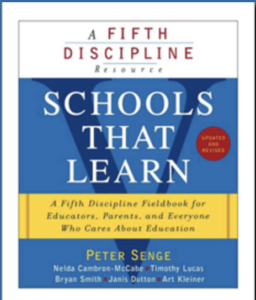
Peter Senge published the 5th Discipline in 1990 about the art and practice of the learning organization and followed up with a 5th Discipline field-book, Schools That Learn. If you have read any of my other work you will see why these 5 disciplines are recurring and interconnected in my life and work. They are Systems Thinking, Personal Mastery, Mental Models, Building Shared Vision and Team Learning. Professional learning is key to the learning organization and if you wish to have more titles and readings to dig into please feel free to reach out.
It’s not just student agency that we are aiming for, it’s learner agency, for all stakeholders.

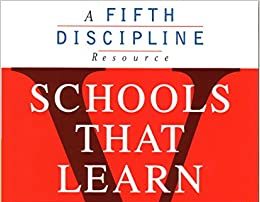
I should also state that we need to consider the positive impacts of the face to face workshops and personal connections made. I’m never an either/or guy. Always yes/and. A nice balance and a specific growth plan.
Thanks for the mention Mike!! I agree that PD needs to be personalized. I always like to compare teacher learning to student learning. I believe that, at FIS, most of us would say that inquiry based learning is the best approach. And what works for students can also work for teachers. This is why I feel so strongly about the action research model of professional development, or what some people call ‘Professional Learning Communities’. This is where groups of interested and invested educators take action in a cycle of inquiry and data driven research. I also like the idea of personalized pathways. This is the same approach we take with students. Real learning begins with curiosity, interest and engagement. It is exciting to see how FIS is leveraging the pandemic and using this experience to transform and innovate education for students and teachers!!
Yes a true PLC model can transform a school as groups of dedicated educators work together to do better for students. There is no such thing as best practice, just better practice!
Mike
Great blog Mike! Your comments on communities of practice really resonates with me. It’s something that occurs formally and informally for teachers in the Scottish FE sector with the constant changes to vocational standards requiring us to regularly “up-skill” . However, the global pandemic has allowed us to widen our communities of practice way beyond previous networks. I don’t think experts in our respected fields have ever been more accessible.
Agreed! I have heard form quite a few consultants that the relationships with organizations are deeper and more impactful on learning. There’s a Phd in here somewhere…
Mike